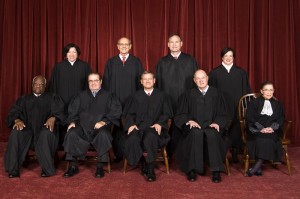 WASHINGTON — The U.S. Supreme Court has decided by a narrow margin to reject a request from Planned Parenthood to block a new Texas abortion law that went into effect on October 31st.
WASHINGTON — The U.S. Supreme Court has decided by a narrow margin to reject a request from Planned Parenthood to block a new Texas abortion law that went into effect on October 31st.
As previously reported, last month, a federal judge appointed by then-President George H.W. Bush struck down portions of the law, declaring the regulations an “undue burden” on a woman’s ability to have an abortion.
District Judge Lee Yeakel agreed with Planned Parenthood and others who had challenged the requirement that abortionists have admitting privileges at a hospital within 30 miles of the facility, and that they follow the Food and Drug Administration’s original dosage protocol for the pill RU-486.
“The admitting-privileges provision of House Bill 2 does not bear a rational relationship to the legitimate right of the state in preserving and promoting fetal life or a woman’s health and, in any event, places a substantial obstacle in the path of a woman seeking an abortion of a nonviable fetus and is thus an undue burden to her,” he wrote. “The court will enjoin enforcement of that provision.”
He also found a medicinal abortion law to be too restrictive, stating that abortionists should have the freedom to determine how best to administer abortion-causing drugs.
But as Texas Attorney General Greg Abbott appealed the injunction to the 5th Circuit Court of Appeals, the three-judge panel disagreed with Yeakel that the admitting privileges requirement served no purpose. It stated that although the law would make it more difficult for women to obtain an abortion, the consequence was merely an “incidental effect,” and was “not designed to strike at the right [to abortion] itself.”
“The district court’s conclusion that a state has no rational basis for requiring physicians who perform abortions to have admitting privileges at a hospital is but one step removed from repudiating the longstanding recognition by the [U.S.] Supreme Court that a state may constitutionally require that only a physician may perform an abortion,” Circuit Judge Priscilla R. Owen wrote on behalf of the panel.
But as the law went into effect on October 31st, Planned Parenthood filed an appeal to the U.S. Supreme Court, asking that it block the 5th Circuit ruling. The abortion giant stated that the law was responsible for the closure of a number of facilities in the state.
“[I]n just the few short days since the injunction was lifted, over one-third of the facilities providing abortions in Texas have been forced to stop providing that care and others have been forced to drastically reduce the number of patients to whom they are able to provide care,” Planned Parenthood wrote in its appeal. “Already, appointments are being canceled and women seeking abortions are being turned away.”
On Tuesday, the court decided 5-4 to reject the request. Justices Scalia, Alito, Thomas, Roberts and Kennedy led the majority, while Justices Breyer, Sotomayor, Ginsburg and Kagan said that the injunction against the law should have remained in effect.
“[T]here is no doubt that the applicants have not carried their heavy burden of showing that doing so was a clear violation of accepted legal standards—which do not include a special ‘status quo’ standard for laws affecting abortion,” wrote Justice Scalia. “I would maintain the status quo while the lower courts consider this difficult, sensitive, and controversial legal matter.”
While Planned Parenthod stated that the hospital admitting requirement was “outrageous and unacceptable,” and that the organization would continue fighting in the courts, Texas Governor Rick Perry applauded the Supreme Court for its favorable outcome.
“This is good news both for the unborn and for the women of Texas, who are now better protected from shoddy abortion providers operating in dangerous conditions,” he said. “As always, Texas will continue doing everything we can to protect the culture of life in our state.”
Texas officials have stated repeatedly that the legislation does not aim to end abortion, but rather to regulate its practice. There are a reported 80,000 abortions in Texas each year.
Become a Christian News Network Supporter...


